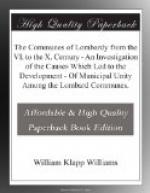I say with a few exceptions, for among these very exceptions are to be found certain alterations in the government of the cities, introduced chiefly by the necessities of the system of central government established by Charlemagne, but also partly by the claims of individuality, which at this time first began in the cities timidly to call for recognition. The very relation of the cities with the central power seems to me to be a much more important factor in their growth during this period than is generally supposed; for it not only secured to their inhabitants better chances of justice and protection from the powerful local rulers, but, bringing them, through certain officers, into direct connection with the head of the state, added not a little to their moral importance, a condition which in a growing community is always closely followed by an increase of material importance. According to their size they were the seats of courts of varying degrees of importance, and from them as centres proceeded the acts of royal officers, both ordinary and extraordinary. Ticinum was the capital, where in Lombard times the king had his palace.[9]
For a satisfactory study of the development of the municipal institutions we need a thorough understanding of the organization of society at this time, and especially of the relations which the municipal and rural communities bore to one another and to the government. I will endeavor to give, therefore, a description of Lombard society about the close of the eighth century, as brief as is consistent with a clear understanding of these relations, and as complete as the great difficulties of the subject will permit, pointing out, whenever they are authentically traceable, the changes introduced in consequence of the Carlovingian conquest.
When we reach in Lombard history the period when the power of the native kings was first overthrown by foreign arms, we are no longer confronted by many of the problems which necessarily formed an important part of the earlier portions of our investigation. I mean the problems which arise in a state of society where the mass of individuals forming it is made up of two elements, a conquering, dominant one, and a conquered, subject one. During the two centuries elapsed since the Lombard barbarians conquered Italy, the two races, originally so different in their ideas and in their character, so opposed in their customs and in their nature, have been slowly but surely blending together, on the strength of common environment and by the necessities of mutual relations: so that by the last half of the eighth century, we can truly say that national differences, as such, have disappeared, and left behind them a single race, a combination but still a unity. We no longer have to deal with a double nationality, with the northern conquerors and their southern victims, with the oppressed and their oppressors. In considering the development of the institutional life of the people, we need no longer seek for differences, but may assume the easier task of tracing similarities. In a word, we no longer speak of Lombards and of Romans, but describe all that remains of both by the new word Italians.




